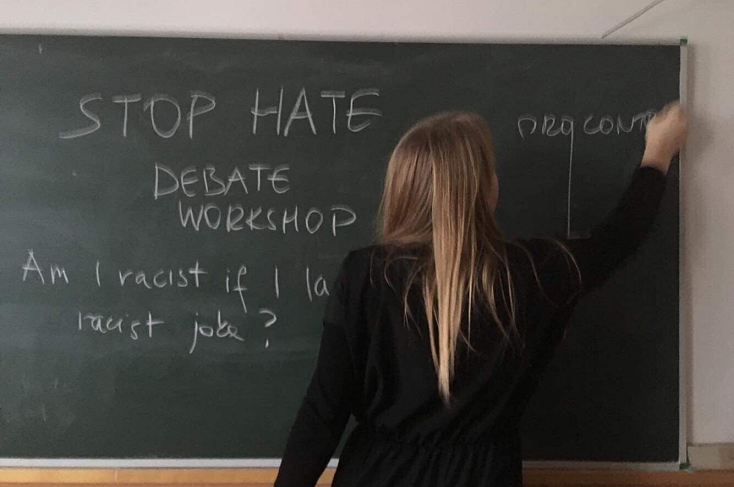Stop Hate: Sharing experiences by the Hungarian team
ASUL | From the 4th to the 11th of November we had the opportunity to take part in the training cours e STOP HATE in the Spanish city Torremolinos that aimed to equip youth workers with the skills and knowledge necessary to develop practical tools and counter-arguments to online hate speech which they can use in work with young people. It was an Erasmus+ KA1 training course, so all the activities were done through the methods of non-formal education (for example role plays, simulations, acting…).
Our sending organization (ICRP Budapest – Institute for Cultural Relations Policy) helped us to plan our travel and the hosting organization ASUL (Association Universitaire Latino-Américaine) organized our stay in Málaga. The project involved 24 participants between 18-35 years old representing Belgium, Spain, Germany, Denmark, Hungary and Romania, but the participants came basically from all over the world.
Before the project we spent two days in Malaga, visited the old town and the magnificent castillo de Gibralfaro, went to the beach and got used to the warm and sunny Spanish climate which was quite unusual for us after the Hungarian rainy November. Fortunately the weather was nice enough to take long walks and even to have a midnight swim in the sea. We arrived to Torremolinos before the other nations, so we still had some time to discover the city. All participants were accommodated at Hotel Natali in Torremolinos and most of our sessions were organized in the basement of the building.
The 4th November was dedicated to the arrival of the participants, so the first session was held on the next day in the morning when all the participants were gathered together in order to get to know each other via non-formal methods e.g. ice-breakers, games, team building activities.
During the following days we were usually organized into smaller groups of mixed nationalities and we worked on mini-projects each day together. We were given very motivating, interesting, engaging and thought-provoking topics like Hate speech in Europe today, Cyberhate, How to counter hate speech on the internet, European commission programmes as a hate speech initiative and last but not least about the No Hate Speech Movement as a youth campaign of the Council of Europe. Trough the week we were given not only theoretical but also practical training. After each lecture we gained practical knowledge through a group or individual assignment that we can use in our own environment. These sessions were very good at changing our mindsets and making us more open about different issues. After working hard on discovering and gaining knowledge on these topics we had our evaluation about the project and we all received an Erasmus+ Youthpass.
During the program, we were able to build many relationships with students from other countries. In this multicultural environment, we could learn a lot not only about the camp but also about each other, which made the even more valuable, because we can use this experience later in our studies and work as well.
In summary, the camp provided us many opportunities for personal and professional development. In our opinion, it has helped everyone understand why it is important to know and respect other cultures in such a rapidly changing world and we understood how as individuals we can change our society.
Áldozó Borbála, Barla-Szabó Zsófia, Darányi Mihály, Varga Tímea

Leave reply